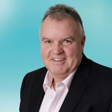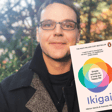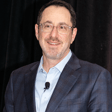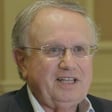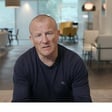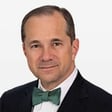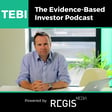Become a Creator today!Start creating today - Share your story with the world!
Start for free
00:00:00
00:00:01

Ep 12: Vanguard sets its sights on Europe
Everyone knows by now how phenomenally successful Vanguard has been in the US in the last few years. But it’s not doing badly elsewhere in the world either.
For the latest TEBI Podcast, I’ve been interviewing Dr Peter Westaway, Chief Economist and Head of Investment Strategy for Vanguard Europe.
Among the questions I ask him are these:
Is tit true that markets are more “uncertain” now than they normally are?
Has Quantitative Easing made it harder for active managers to outperform?
How much attention should investors give to interest rate decisions?
What progress is Vanguard making in Europe, and where does its priorities lie?
Transcript
Introduction and Guest Introduction
00:00:05
Speaker
Hello and welcome to episode 12 of the TEBI podcast, brought to you by the evidence-based investor in conjunction with Regis Media. I'm Robin Powell, and you'll find my blog at evidenceinvestor.com. That's evidenceinvestor.com. My guest this week is Dr. Peter Westerway, Chief Economist and Head of Investment Strategy Group for Vanguard Europe.
00:00:31
Speaker
Dr. Westerway was previously Chief Economist Europe for Nomura International and a senior official at the Bank of England. He's also a visiting professor at Queen Mary University of London.
Vanguard's Economic Analysis and Active Management
00:00:43
Speaker
As I'm sure you're aware, Vanguard is best known for providing low-cost funds and is the world's biggest provider of index funds specifically.
00:00:52
Speaker
It doesn't really do market timing or tactical asset allocation. So why, I started by asking Dr. Westerway, does Vanguard really need a chief economist at all? I think there are two reasons why there is an important role for having economics analysis in Vanguard and having a chief economist for Europe in particular.
00:01:14
Speaker
One is that even though here in Europe we are almost entirely passive in what we offer globally, we actually do offer quite a large chunk of active funds as well and in particular we have a range of active fixed income funds. So out of the 4 trillion or so dollars under assets under management globally,
00:01:36
Speaker
under just about a third of them are active in some way. Not all of it internally managed, some of it is sub-advised. So we're not against active management but we think active management has a role if it's provided at low cost and if it's provided with realistic expectations about what it can achieve. And so fundamentally the idea of
00:02:00
Speaker
trying to tie markets, trying to pick winners, we are pretty sceptical about, but there is still a role for it. The second reason is, and this is actually really important, and the longer I've done this job, I've been doing it five years now, the more clear it's become to me. Standing up in front of a bunch of investors, retail, financial advisors, even institutional clients, even if you're talking about passive,
00:02:24
Speaker
It's incredibly important to be able to explain what the risks are out there in the market, where we think the tensions are, where there may be opportunities and so on. If you can then say, look, I spend all of my day worrying about these things, I spend all my time looking at markets, and I don't really know what's going to happen next. So I'm humble about what we're able to achieve, and so don't you
00:02:47
Speaker
stay at home investor or financial advisor who probably doesn't spend that long thinking about stock picking or market timing. Don't you try and do it because it's really difficult. If you are going to do it, here are some perspectives we've got about where we think the market might be under priced or where we think there may be opportunities. But generally, the simple message we like to tell the majority of our investors is keep it simple because over the long run, that delivers you good value.
Challenges in Economic Forecasting
00:03:15
Speaker
Something that advocates of active fund management often overlook is that the economy and the financial markets are not as closely interrelated as many assume them to be. Economic forecasting is notoriously hit and miss and one of the lessons of recent times is that political predictions are not easy either.
00:03:35
Speaker
I think it's true both for the Brexit incident in last year and also for the election of Donald Trump. Both of them were events that many people spent a lot of time talking about in the market.
00:03:48
Speaker
As you say, very difficult to predict these things in advance. But even if you had the opportunity of 2020 hindsight, it's very difficult to have anticipated the way markets subsequently moved. We've seen a surge in equity markets, much stronger than anybody thought after the election of Donald Trump. And we've seen a pretty good performance from the economy and from markets after Brexit in the UK. So yeah, I think we need to be humble.
00:04:14
Speaker
I wouldn't go the whole way and say there's no link between economics and markets. I mean, there are a few fallacies out there. For example, high growth economies imply high returns in stock markets. I think that's a big old fallacy out there that if you actually look at the data,
00:04:30
Speaker
What you really need to know about isn't high growth, per se, but whether you can predict growth relative to what everybody else thinks. And that's a good example of where knowing something about economics might help you. If you're a better predictor of how the Chinese economy is going to evolve, then that might give you an edge when that unexpected news comes out, which causes the market to surge. But it's not always as easy as that.
00:04:58
Speaker
One of my personal bugbears is how the industry is always telling us we live in uncertain times. We are though hearing that even more than usual just at the moment. So I asked Peter Westerway, does he think there's any truth in it?
00:05:13
Speaker
Not all of our listeners will remember this far back, but Mandy Rice-Davis and the old Profumo trial, they would say that, wouldn't they? I think they're under a lot of pressure at the moment. And I think over the years, you do hear active managers saying, oh, we're in a down market. This provides an opportunity for us to add more value. We're in an up market. We're in a stable term. We're in a volatile term.
00:05:34
Speaker
The evidence shows that it's very difficult for active managers to outperform in all types of market. And fundamentally, the reason for that is, if you think about the market as a whole, before costs, 50% of active managers are going to outperform the average, and 50% are going to outperform the average. You can't escape from that. Once you add in the effective costs,
00:05:56
Speaker
it's very difficult for the average active manager to outperform because that cost drag pushes people below the return that the benchmark would give you all.
00:06:07
Speaker
or a passive manager would give you. Now that's not to say that there aren't some good active managers out there, but finding them, you can't just look at who's done well last year and assume that they're going to be the good one. And even if you do find them, I mean we've done some really interesting analysis which shows that if you look at the successful active managers with the benefit of 2020 hindsight, let's say looking back over 15 years, even for those active managers,
00:06:34
Speaker
They experience periods of five, six, seven, eight years of underperformance during that period when eventually they outperform. So as an investor in an active fund, not only have you got to be able to pick the ones that are going to ex-post outperform, you've got to have the patience and the guts to stick with it, stick with your original conviction.
00:06:58
Speaker
I mean, for an individual that's hard, for a financial advisor who's having to pick up the phone from his client saying, why is your fund underperforming, takes a big personality to say, no, I'm going to stick with this. So it just makes life very difficult.
00:07:13
Speaker
We're going to take a short break there. In a moment, I'll be asking Dr.
Sponsor Message
00:07:17
Speaker
Westaway whether quantitative easing has made it harder for active managers to outperform. But first, here's a message from our sponsor Regis Media, connecting advisors with clients.
00:07:29
Speaker
Hi it's Will, I'm a producer from Regis Media. We know running a financial advisory firm is hard work, but we also know the value of high quality regular content and marketing, and that's where we come in. We support firms by helping them attract and retain clients through a mixture of video content, social marketing and written articles. To find out more visit our website RegisMedia.com
Impact of Quantitative Easing on Active Funds
00:07:53
Speaker
Welcome back, I'm Robin Powell and this week I'm interviewing Dr Peter Westaway, Chief Economist and Head of Investment Strategy Group for Vanguard Europe. Quantitative easing has been a hot topic of conversation in the financial world in recent years. Advocates of active fund management often tell us that by distorting the markets,
00:08:15
Speaker
QE has made it harder for active managers to beat the market and that as central banks start to rely on it less and less, active will make a comeback. What is Dr. Westerway's view on that?
00:08:28
Speaker
Well, I think there's two elements to your question. Has QE distorted, to use a loaded term, market prices and market returns? Yes. That's precisely what it was designed to do. QE is a way of making monetary policy even more accommodative than it otherwise was when you bumped up against zero. So you're sort of trying to provide even more stimulus. I think that's been the case.
00:08:53
Speaker
And inevitably, that means at some point in the future, we've had a very strong run of falling interest rates, strong fixed income returns. Looking forward, I think those fixed income returns are going to be worse than they have been historically, as that thing unwinds itself over a period of years, however long that's going to be. Whether that provides an opportunity for passive managers to do better than active, I've never really understood the logic of that argument. I don't quite see
00:09:21
Speaker
active managers have got the same information as everybody else. They know that when QE happens it's going to have a certain effect and everybody has that information. So I don't buy that argument at all. As well as the easing of QE we're almost certainly going to see rising interest rates over the next two or three years. It's already happening in the US.
Interest Rate Expectations and Investor Strategy
00:09:40
Speaker
Some investment journalists make a really big thing of interest rate decisions but again it's very hard to predict from one month to the next
00:09:48
Speaker
what the Fed and the other central banks are going to do. So should investors ignore interest rate decisions altogether? No, I don't think they should ignore interest rate decisions and I think commentators, economists like myself can.
00:10:03
Speaker
give a pretty good steer on when interest rates are going to change next. But I do agree with your sentiment that maybe there's too much focus on the exact date, the exact timing. At the end of the day, what matters for a long-term investor isn't really whether the Fed are going to raise rates in June or maybe earlier in March or later in September.
00:10:23
Speaker
What matters much more is the broad direction that interest rates are heading and what that means. And I think the key difference with interest rate directions and movements over the next couple of years, take the US to start with, is that interest rates are going to go up.
00:10:39
Speaker
they're going to go up gradually but inexorably. But the point that they finally get to when they settle down at some new normal is going to be lower than it used to be. So whereas in the past we were very much used to seeing, you know, this is in pre-crisis days, the normal level of interest rates was what, 5%, might be 4.5%, might be 5.5%, whereas I think the new normal is much more likely to be around 3% or something like that.
00:11:06
Speaker
And that's got nothing to do with what the Fed are deciding to do. It's much more to do with the equilibrium conditions of the global economy. We're in a new, lower growth economy. There are structural forces out there that means the interest rates are lower than there were. Lots of savings are still out there. All of those forces mean that interest rates will settle down at a lower level. And as a result,
00:11:30
Speaker
asset returns are probably going to be a bit lower than they used to be for a sort of standard safe asset. And so to get to your key question, what does that mean for investors? I think investors have to recognize that when we talk about a low return environment, yes, of course, returns are low now because of what central banks are doing. But even after that's washed out,
00:11:54
Speaker
I think returns are going to be lower than they used to be. And that means to achieve the same returns in retirement, for example, the same income in retirement, people are going to have to save more.
00:12:06
Speaker
If they want, they can move along the risk spectrum, which is what many people are doing, invest in riskier bonds, put more money in equities. But what people mustn't do is kid themselves that somehow they're making the same investments that they were before. You can strive for higher income.
00:12:24
Speaker
or higher returns, but you're doing that at the expense of taking on more risk. And I think that's the real danger that, you know, we hear all of these things about people investing in high yield funds, emerging market bonds, infrastructure funds to get income. All of these different strategies all have their value, but let's not pretend that we're not changing the nature of our portfolio as we skew towards them.
00:12:49
Speaker
It's well known that Vanguard in the US has been on a brilliant run, attracting huge inflows at the expense of its rivals.
Vanguard's Expansion in Europe
00:12:57
Speaker
The company is now looking to expand in Europe, so will Vanguard Europe benefit from the astonishing success the firm has had in the US?
00:13:08
Speaker
Yeah, I think we will and I think we already are. I mean, we're starting to make great headway in the UK in both, well, in the advisory market. We're hoping to build out our offering in defined contribution pension offers, starting to offer the sort of target retirement funds that people can use as a default in their pensions. They've flown off the shelves in the US and we think there's a compelling case for them here.
00:13:32
Speaker
We have some very compelling savings products at our life strategy range, which is really a very simple equity bond composition, very simple static allocation, most popular multi-asset fund in the market at the moment. So that's doing very well, but I think as we build out, I think that will continue to be the case.
00:13:53
Speaker
What's given us an advantage in the UK, and we're a bit further behind in the US, in Europe, is the regulatory environment. So a move in the UK away from having to give rebates, which has meant that we've now been able to sell in an unencumbered way, there's still challenges in the European markets. So at the moment, it's much more difficult to break into the banking
00:14:21
Speaker
system that's in operation. But we're getting there. We're making headway. So for now in Europe, the main focus that we have is selling our range of ETFs to institutional investors who see that we've got a compelling, low-cost, building block product that they can use. And that's starting to get traction as well. And traditionally, Vanguard have sold into the Netherlands and Switzerland. We have plans to build out in other big markets, Germany, Italy. So watch this space, really.
00:14:48
Speaker
So exciting times for Vanguard Europe. What does the future hold for passive investing generally in the UK and on the continent?
00:14:57
Speaker
The reality is that something like 85% of the market is still in active funds. Now, as we've heard from the FCA study that's just come out, a lot of those active funds don't offer good value for money. They're either systematically underperforming, they're offering closet trackers, or they're offering strategies that can be replicated
00:15:21
Speaker
more cheaply in other ways and so I think we're going to see a shake-up of the industry where many of those unprofitable or inefficient producers fall away and I think we'll be left with a more passive provision and then the active managers at the left will be providing a better product whether we're talking about idiosyncratic strategies or factor-based approaches or whatever. I think there's a role for that but at the moment the market doesn't feel like it's an inequality
Conclusion
00:15:51
Speaker
That's all for this week, thank you to Peter Westerway and to our sponsor Regis Media, Connecting Advisors with Clients. Until next time, from me Robin Powell, goodbye.






